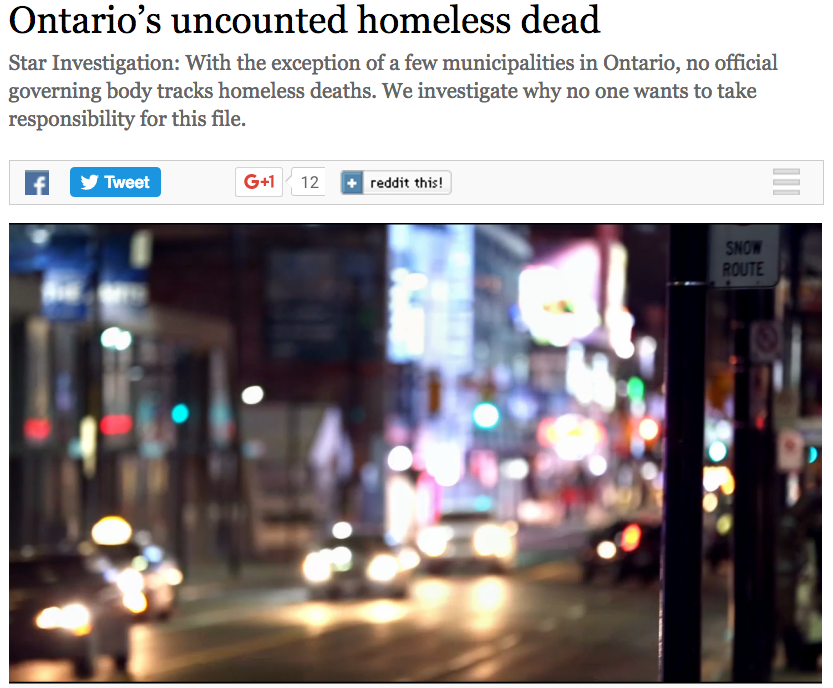‘Spotlight’ on homeless deaths
Toronto Star investigative journalism has had a positive impact on Toronto’s homeless.
By Cathy Crowe and Naheed Dosani
We didn’t need to see the Hollywood film Spotlight to know that investigative journalism makes a difference in the court of public opinion and social policy.
Spotlight is the 2016 Oscar-winning Best Film that chronicles the Boston Globe’s Spotlight team that exposes the conspiracy between the Boston Archdiocese, lawyers and government officials that kept secret the extensive pedophilia by Catholic priests.
Worldwide, there are journalists and media outlets that have upheld the tradition of investigative journalism rooted in the values of democracy, social justice and human rights.
Closer to home, there is the Toronto Star and its commitment to the six Atkinson principles, developed by the legendary Star publisher Joseph Atkinson. The principles have been described as promises that offer hope and inspiration. They include a commitment to a strong, united and independent Canada, social justice, individual and civil liberties, community and civic engagement, the rights of working people and the necessary role of government.
In 1998 the Star ran a front-page headline “Plight of the Homeless: a National Disaster” with a feature by the Star’s social policy reporter Laurie Monsebraaten. The story absolutely rocketed homelessness onto the national agenda. Homelessness was covered on page one for 11 days straight.
The Star even assigned reporter Catherine Dunphy, for the first time in Canadian publishing history, to cover homelessness solely. Nationally, this was a tipping point, leading to federal government action and the launching of a new federal homelessness program.
In the subsequent years the Star has exposed tuberculosis outbreaks in the homeless population, pictures and stories of shelter conditions that don’t meet the United Nations standards for refugee camps and, recently, the tragedy of homeless deaths.
Mary Ormsby and Kenyon Wallace’s investigative piece “Ontario’s Uncounted Homeless Dead” laid out the tragedy of over 800 known homeless men, women and children who have died in Toronto amidst the seemingly decades-long absence of provincial government attention.
It’s a tragedy because we know that people who are homeless experience disease and subsequent death disproportionately as compared to housed Canadians. Average life expectancies for the homeless have been estimated to be between 34 and 47, while some studies have confirmed that homelessness cuts life expectancy by 50 per cent. This has caused many, including us, who work in the streets with the homeless and vulnerably housed to conclude that homelessness is a life-limiting disease or a terminal diagnosis.
Despite the pleadings of homeless people themselves, activists’ efforts, numerous inquests, funerals and monthly memorials, it took this journalistic endeavour to help push the public policy forward.
Only six weeks after the article, Toronto City Council voted almost unanimously to direct city staff to start collecting data on all homeless deaths and to advocate for action from the province, recognizing the data can help to also identify solutions. As Councillor Paul Ainslie stated, “If we don’t know the real numbers, how can we make any real change?”
Like the journalists featured in Spotlight, Ormsby and Wallace made real change happen. Their efforts, inspired by the spirit of social justice and equity, led to policy change at a political level—one that advocates all over the city, are grateful for.
In turn, we can now have the information we need to understand the underlying causes of mortality of Toronto’s homeless better and add to the growing body of evidence in support of policy changes that emphasize ending homelessness. Hopefully, one of those changes will include a national housing program.
Cathy Crowe is a street nurse and Distinguished Visiting Practitioner at Ryerson University. She is a past Atkinson Economic Justice Fellow.
Naheed Dosani is a palliative care physician working with Inner City Health Associates’ PEACH (Palliative Education And Care for the Homeless) program.

